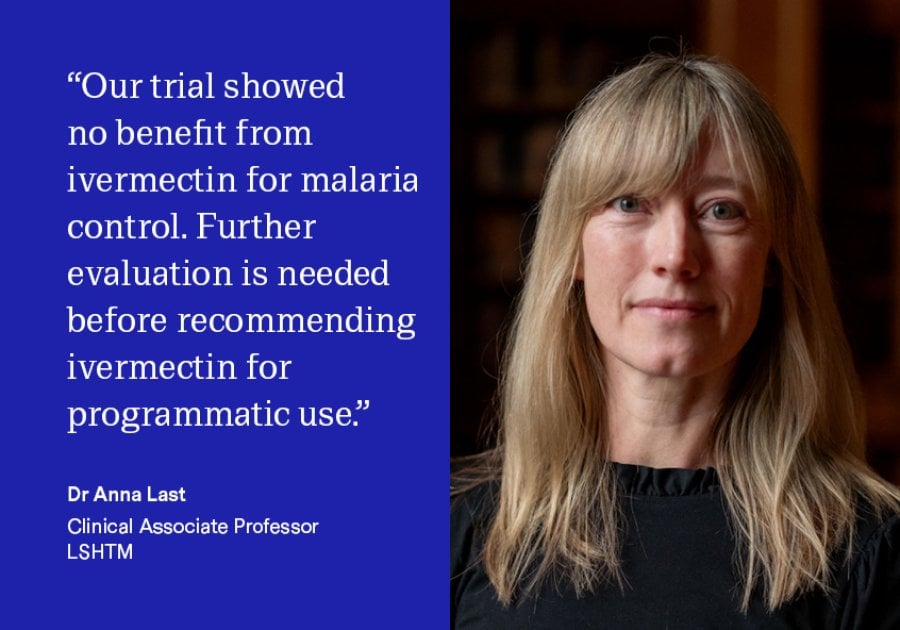
"'Our trial showed no benefit from ivermectin for malaria control. Further evaluation is needed before recommending ivermectin for programmatic use." Dr Anna Last, Clinical Associate Professor
The addition of ivermectin, in this case used as an endectocide, to mass drug administration (MDA) with antimalarial drugs does not reduce malaria prevalence further than giving the antimalarial drugs alone, according to a study led by researchers from the London School of Hygiene & Tropical Medicine.
The findings, published in The Lancet Infectious Diseases, present the first trial designed to evaluate whether ivermectin gives additional benefit when given alongside dihydroartemisinin–piperaquine (DHA-PPQ) as MDA, compared to giving DP MDA alone. It follows previous studies suggesting a potentially beneficial effect.
Involving 25,882 participants, the fully-blinded cluster randomised trial was carried on the Bijagos Archipelago of Guinea-Bissau, where malaria transmission is highly seasonal. Interventions were delivered in the rainy seasons in 2021 and 2022. The trial design and island setting provided the opportunity to consider movement of vectors and people in the evaluation of this intervention.
The trial compared two groups. One group received both ivermectin and DHA-PPQ, while the other received DHA-PPQ and a placebo. Both groups followed the same treatment schedule, with medication administered over three days in three consecutive months during the malaria transmission season.
There was no statistically significant difference in malaria prevalence between the two groups at the endline survey, completed during the peak malaria transmission season following two years of seasonal intervention. In the intervention group, Plasmodium falciparum infection was found in 6.64% of people, compared to 5.05% in the placebo group (Risk Difference 1.67 (95% CI -1.44-4.78, p=0.28). Entomological outcomes, such as mosquito age structure and number of trapped mosquitoes, also showed no difference between groups at any of the measured time points, despite the addition of ivermectin. Other secondary outcomes looking at incident infection and clinical malaria in the two groups also showed no difference.
The researchers concluded that the use of ivermectin in its current format and dose regime posed several important challenges. Some groups, such as young children and pregnant women, were not eligible to take ivermectin for safety reasons, which leaves potentially a sizeable proportion of the community without ivermectin in their blood, meaning that mosquitoes who feed on these individuals will not be affected. Ivermectin does not last for a long time in the blood, even with these higher doses, and thus, the effect will wane over time, with reduced community levels of ivermectin during the malaria transmission season.
They suggest that further research may be useful in the evaluation of alternative formulations or regimens of ivermectin in different settings to determine whether ivermectin has any role in malaria control.
Dr Anna Last, Clinical Associate Professor at LSHTM and Principal Investigator of the study, said:
“It is disappointing that this widely available, safe and cheap intervention did not have the anticipated effect in driving down malaria in this setting. Our trial showed no benefit from ivermectin for malaria control. MATAMAL provides important context for future studies considering the use of ivermectin, or other endectocides, as part of a package of malaria control interventions; and to policy makers considering ivermectin for malaria control. Further evaluation is needed before recommending ivermectin for programmatic use.
The MATAMAL team, from the UK, Guinea-Bissau and The Gambia, should be congratulated for completing this important Phase 3 trial, particularly in the context of significant logistic challenges posed by the COVID-19 pandemic."
Professor Umberto D’Alessandro, Director of the Medical Research Council Unit The Gambia and Co-I of the study, said: “In The Gambia, we had already evaluated mass treatment with ivermectin combined with an antimalarial drug, and found a significant impact. However, the individual effect of ivermectin could not be separated from the effect of the antimalarial treatment. MATAMAL fills this gap as it determined the impact of ivermectin when given on the top of mass treatment with an antimalarial. Unfortunately, there was no major impact and thus adding ivermectin to mass treatment is not recommended, at least for the time being.”
The study was funded by the National Institute for Health and Care Research, the Medical Research Council, Wellcome Trust, and the UK Foreign, Commonwealth & Development Office.
If you enjoyed this article and would like to build a career in global health, we offer a range of MSc programmes covering health and data, infectious and tropical diseases, population health, and public health and policy.
Available on campus or online, including flexible study that works around your work and home life, be part of a global community at the UK's no.1 public health university.
